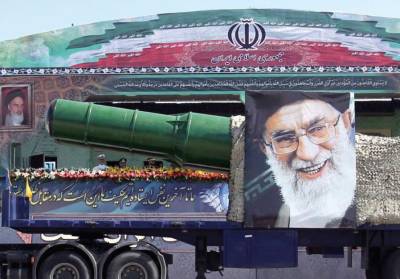
U.S. President Donald Trump, while speaking to his supporters in Indiana, expressed his desire to conclude a “good deal” with Iran. One of the main demands that Trump described is the possibility of inspecting military bases in Iran by American specialists. Earlier, on May 8, the U.S. terminated a nuclear agreement with Iran, that had been effective from 2015.
Aktualnye Kommentarii discussed possible scenarios for the further development of the situation around Iran with Oleg Matveychev, political scientist and professor at the Research University Higher School of Economics.*
— It seems like it was going to happen this way. Originally, when Donald Trump signed the termination of the nuclear agreement with Iran, and later, when he was tweeting about it, he kept this door open. And the statements of the European partners that they will not withdraw from the deal with Iran. All of that led to the fact that firmer terms of trade will be discussed from now on. Considering that Trump is heavily influenced by the Israeli lobby, I think it will not just concern the situation with freezing of the nuclear program. It is clear that everyone understands nothing related to the creation of nuclear weapons will take place there in the next 10 years. Thus, everything will remain the same, only with stricter monitoring.
Also, Trump will demand that Iran stops supporting Shiites in Yemen, Hezbollah in Lebanon, and the Shiite forces and Hezbollah in Syria. In short, he will basically demand that there is better security for Israel, and that Iran has less influence and interferes less with U.S. actions in the Middle East.
The European partners will accept all of the United States’ demands — they are not independent. Do you think it was good for them when sanctions against Iran were introduced last time? Some European countries received up to a third of their oil from Iran, and then had to buy it for almost twice as much. For example: Italy. So what happened? Italy did not even squeak about it.
As for Iran itself, in any case, it will continue to support Shiites all over the world. It makes no sense to say that you can reject it and become a traitor. It is simply necessary to find more sophisticated ways of bypassing all kinds of controls.
Or maybe Iran will not deal with it at all. Iran is pretty strong. It has two powerful allies — Russia and China. Therefore, it can refuse to renegotiate the agreement altogether. Or go along with some kind of symbolic revision, so that everyone will formally leave the situation without losing face.
Washington’s exit from the deal and its revision is not the end of the world. Is the U.S. going to start a war against Iran? It could not even win in Syria. It won’t be able to beat Iran, which is much stronger than Syria, without nuclear weapons. And, if nuclear weapons are used against Iran, that would be a direct blow not only to the reputation of the United States, but also an indirect blow to Israel.
The United States has let the Iranian situation slip through its fingers. Maybe 10 years ago, it would have been possible, when there were no crises in South Ossetia, or in Ukraine, Crimea, or Syria; when Russia had not “shown its teeth” yet. In 2005 for example, George W. Bush, along with Afghanistan and Iraq, could quite well have also invaded Iran, and everything could have been destroyed there. No one would have even gotten in his way. Now, the situation in the world is completely different.
*Translator’s note: Aktualnye Kommentarii is a Russian social and political Internet publication, founded in 2008. The National Research University Higher School of Economics is one of the leading and largest universities in Russia.

Leave a Reply
You must be logged in to post a comment.